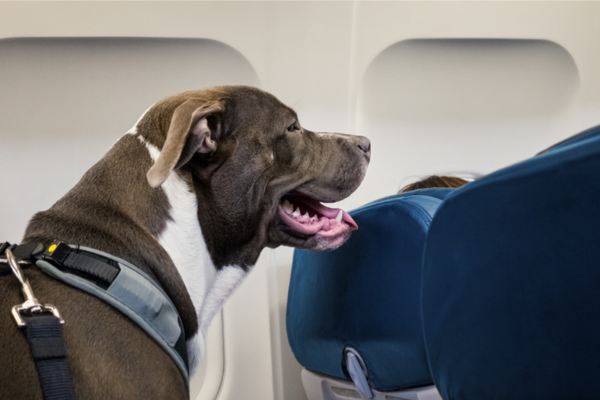Service Dog Handlers value service dogs because they assist with mobility issues and help during emergencies, allowing the handlers to remain independent in their daily lives.
Because of their importance, service dogs enjoy rights that do not pertain to most pets. But what about public transportation? What ADA service dog regulations apply to public transport?
This article will review ADA regulations on public transportation so you understand service dog rights.
What is the Americans with Disabilities Act (ADA)?
The Americans with Disabilities Act (ADA) sets guidelines for interacting with disabled people to ensure no one discriminates against them. It means they have access to the same opportunities as non-disabled people.
What is the Scope of Public Transportation Covered Under the ADA?
The ADA has specific guidelines for public transportation, including buses, shuttles, trains, subways, and taxis. The guidelines include the following:
- Riders must provide visible information on the accommodations their service dog provides.
- Public transportation must have accessible features like lifts, ramps, and grab rails.
- Operators must give disabled people enough time to board.
- Service animals are allowed on public transportation.
- Vehicles must have priority signs for disabled passenger seating and accommodations.
- Operators must be trained to treat disabled passengers respectfully and provide them with the required assistance.
Rights of Service Dog Handlers in Public Transportation
Titles II and III of the ADA provide an overview of the Department of Justice’s (DOJ) requirements for state and local governments and Places for Public Accommodation. They define service animals as “a dog trained to perform work or tasks to benefit a person with a disability.” They present information concerning identifying service animals and where they are allowed.
The following are considered service dogs:
- Guide dogs and seeing eye dogs
- Hearing and signal dogs
- Psychiatric service dogs
- Sensory signal dogs (SSigDOG)
- Seizure response dogs
The ADA states that a person traveling with a service dog cannot be denied access to public transportation. Furthermore, public transportation providers cannot force disabled passengers with service dogs to sit in a specific seat. Providers cannot charge fees for additional accommodation and do not require advance notice that passengers will bring a service dog on a public transport vehicle.
Documentation and Identification
Public transportation workers may only ask handlers two questions:
- Is the dog required because of a disability?
- What work is the dog trained to perform?
It is illegal for workers to make handlers “prove” their dog is a service dog. Service dogs do not require registration or certification. However, in some states, posing as someone who requires a service dog is a misdemeanor.
The ADA considers asking additional questions or requesting documentation discriminatory and against its regulations.
Special Considerations for Air Travel
The Air Carrier Access Act (ACAA) makes it illegal for airlines to discriminate against disabled passengers. Airlines must also provide disabled passengers with accommodations such as wheelchair transport and early boarding and allow service animals on the aircraft.
Airlines do not need to ask passengers for documentation to allow service animals on the plane. They can ask if the service animal is required due to a disability and what tasks it performs for its handler. They may also look for harnesses, leashes, vests, and tethers and observe the dog’s behavior.
In some instances, airlines may have handlers fill out a U.S. DOT form attesting to the animal’s health, behavior, and training and a second U.S. DOT form ensuring the animal can relieve itself in a sanitary manner if it is on the flight for hours or more.
The ACAA and ADA may have similar goals, but they are different. The ADA refers to airports and services. The ACAA covers the airline, its services, and the aircraft.
Handling Common Issues
Handlers with service animals cannot be denied service. If passengers have allergies or are afraid of dogs, they may find a seat on the other side of the vehicle.
If a service animal is disruptive or poorly behaved on public transportation, workers may ask the service dog handler to gain better control of the situation. Providers may ask the handler to leave the vehicle if the service animal repeatedly acts out of turn.
Organizations may be within their rights to have a service animal removed from public transportation if it behaves poorly. Service cannot be denied for any other reason.
If you believe you have been wrongly discriminated against due to your service animal, you may file a complaint with the Department of Justice (DOJ). There is a specific form you can fill out to file a complaint against air carriers through the U.S. Department of Transportation, which is available at the following link: http://www.dot.gov/airconsumer/file-consumer-complaint
You can also file a federal or small claims court lawsuit for monetary damages.
Conclusion
Public transportation providers must respect ADA service dog regulations. Service dogs and their handlers must be provided access to all public vehicles and treated with respect when riding in them.
If your organization is having trouble aligning with ADA service dog regulations, Justice Speaks can help. We provide workplace compliance for employees, HR, and senior staff members. We will ensure your company complies with local laws and avoids legal action.
Contact us for the training required to remain compliant and protect your business reputation.


